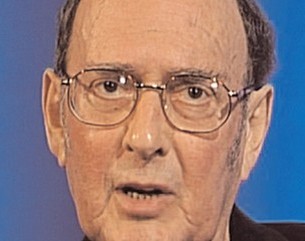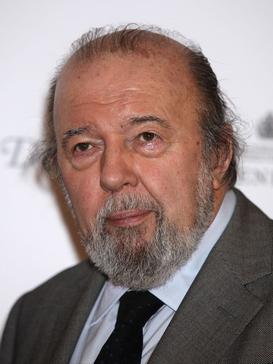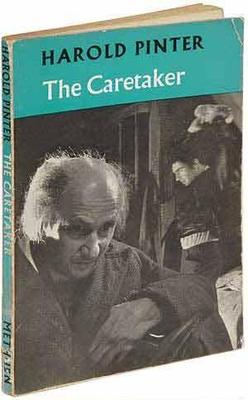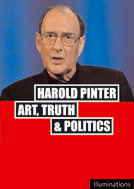
The theatre of the absurd is a post–World War II designation for particular plays of absurdist fiction written by a number of primarily European playwrights in the late 1950s. It is also a term for the style of theatre the plays represent. The plays focus largely on ideas of existentialism and express what happens when human existence lacks meaning or purpose and communication breaks down. The structure of the plays is typically a round shape, with the finishing point the same as the starting point. Logical construction and argument give way to irrational and illogical speech and to the ultimate conclusion—silence.

Harold Pinter was a British playwright, screenwriter, director and actor. A Nobel Prize winner, Pinter was one of the most influential modern British dramatists with a writing career that spanned more than 50 years. His best-known plays include The Birthday Party (1957), The Homecoming (1964) and Betrayal (1978), each of which he adapted for the screen. His screenplay adaptations of others' works include The Servant (1963), The Go-Between (1971), The French Lieutenant's Woman (1981), The Trial (1993) and Sleuth (2007). He also directed or acted in radio, stage, television and film productions of his own and others' works.

The Dumb Waiter is a one-act play by Harold Pinter written in 1957.

Sir Peter Reginald Frederick Hall CBE was an English theatre, opera and film director. His obituary in The Times declared him "the most important figure in British theatre for half a century" and on his death, a Royal National Theatre statement declared that Hall's "influence on the artistic life of Britain in the 20th century was unparalleled". In 2018, the Laurence Olivier Awards, recognising achievements in London theatre, changed the award for Best Director to the Sir Peter Hall Award for Best Director.
No Man's Land is a play by Harold Pinter written in 1974 and first produced and published in 1975. Its original production was at the Old Vic theatre in London by the National Theatre on 23 April 1975, and it later transferred to Wyndham's Theatre, July 1975 – January 1976, the Lyttelton Theatre April–May 1976, and New York's Longacre Theatre from October–December 1976. It returned to the Lyttelton from January – February 1977. It is a two-act play.
Old Times is a play by Harold Pinter. It was first performed by the Royal Shakespeare Company at the Aldwych Theatre in London on 1 June 1971. It starred Colin Blakely, Dorothy Tutin, and Vivien Merchant, and was directed by Peter Hall. The play was dedicated to Hall to celebrate his 40th birthday.

The Birthday Party (1957) is the first full-length play by Harold Pinter, first published in London by Encore Publishing in 1959. It is one of his best-known and most frequently performed plays.

Betrayal is a play written by Harold Pinter in 1978. Critically regarded as one of the English playwright's major dramatic works, it features his characteristically economical dialogue, characters' hidden emotions and veiled motivations, and their self-absorbed competitive one-upmanship, face-saving, dishonesty, and (self-)deceptions.

One for the Road is an overtly political one-act play by Harold Pinter, which premiered at Lyric Studio, Hammersmith, in London, on 13 March 1984, and was first published by Methuen in 1984.

Family Voices is a radio play by Harold Pinter written in 1980 and first broadcast on BBC Radio 3 on 22 January 1981.

The Caretaker is a drama in three acts by Harold Pinter. Although it was the sixth of his major works for stage and television, this psychological study of the confluence of power, allegiance, innocence, and corruption among two brothers and a tramp, became Pinter's first significant commercial success. It premiered at the Arts Theatre Club in London's West End on 27 April 1960 and transferred to the Duchess Theatre the following month, where it ran for 444 performances before departing London for Broadway. In 1963, a film version of the play based on Pinter's unpublished screenplay was directed by Clive Donner. The movie starred Alan Bates as Mick and Donald Pleasence as Davies in their original stage roles, while Robert Shaw replaced Peter Woodthorpe as Aston. First published by both Encore Publishing and Eyre Methuen in 1960, The Caretaker remains one of Pinter's most celebrated and oft-performed plays.

The Homecoming is a two-act play written in 1964 and published in 1965 by Harold Pinter. Its premières in London (1965) and New York (1967) were both directed by Sir Peter Hall. The original Broadway production won the 1967 Tony Award for Best Play. Its 40th-anniversary Broadway production at the Cort Theatre was nominated for a 2008 Tony Award for "Best Revival of a Play".

Tea Party is a play written by Harold Pinter, which Pinter adapted from his own 1963 short story of the same title. As a screenplay, it was commissioned by the European Broadcasting Union, directed by Charles Jarrott, and first transmitted on BBC Television in the programme The Largest Theatre in the World on 25 March 1965. It was first produced on stage in October 1968 as part of a double bill with Pinter's play The Basement.
The Hothouse (1958/1980) is a full-length tragicomedy written by Harold Pinter in the winter of 1958 between The Birthday Party (1957) and The Caretaker (1959). After writing The Hothouse in the winter of 1958 and following the initial commercial failure of The Birthday Party, Pinter put the play aside; in 1979 he re-read it and directed its first production, at Hampstead Theatre, where it opened on 24 April 1980, transferring to the Ambassadors Theatre on 25 June 1980, and it was first published, also in 1980, by Eyre Methuen. The play received its American premiere at the Trinity Repertory Company in 1982. Pinter himself played Roote in a subsequent production staged at the Minerva Theatre, in Chichester, in 1995, later transferring to the Comedy Theatre, in London.
Ashes to Ashes is a 1996 play by English playwright Harold Pinter. It was first performed, in Dutch, by Toneelgroep Amsterdam, the Netherlands' largest repertory company, in Amsterdam, as part of its 1996–1997 season, and directed by Titus Muizelaar, who reprised his production, in Dutch with English surtitles, as part of a double bill with Buff, by Gerardjan Rijnders, at the Riverside Studios, Hammersmith, from 23 through 27 June 1998. Its English première by the Royal Court Theatre opened after the Dutch première, at the Ambassadors Theatre, in London, on 12 September 1996.
Night is a dramatic sketch by the English playwright Harold Pinter, presented as one of eight short dramatic works about marriage in the program Mixed Doubles: An Entertainment on Marriage at the Comedy Theatre, London, on 9 April 1969; directed by Alexander Doré, this production included Nigel Stock as the Man and Pinter's first wife, Vivien Merchant, as the Woman (54). It replaced another sketch performed previously in the program We Who Are About To... at the Hampstead Theatre Club on 6 February 1969; each of the original eight sketches about marriage also featured two characters.

Landscape is a one-act play by Harold Pinter that was first broadcast on radio in 1968 and first performed on stage in 1969. The play shows the difficulties of communication between two people in a marriage. This is illustrated through the two characters who appear to be talking to one another though neither seems to hear the other. The dialogue resembles two independent monologues. The play is often studied, read, and performed alongside Silence, another one-act play published soon after Landscape. Both plays mark a change in Pinter's style, with echoes of the work of Samuel Beckett. In both plays nothing happens, the action of the plays is brought to a halt putting an added emphasis on the role of the dialogues and monologues that take place. As one critic put it "nothing happens but much is explored".
Bibliography for Harold Pinter is a list of selected published primary works, productions, secondary sources, and other resources related to English playwright Harold Pinter (1930–2008), the 2005 Nobel Laureate in Literature, who was also a screenwriter, actor, director, poet, author, and political activist. It lists works by and works about him, and it serves as the Bibliography for the main article on Harold Pinter and for several articles relating to him and his works.
Characteristics of Harold Pinter's work identifies distinctive aspects of the works of the British playwright Harold Pinter (1930–2008) and gives an indication of their influence on Anglo-American culture.

"Art, Truth and Politics" is the Nobel Lecture delivered on video by the 2005 Nobel Laureate in Literature Harold Pinter (1930–2008), who was at the time hospitalised and unable to travel to Stockholm to deliver it in person.












